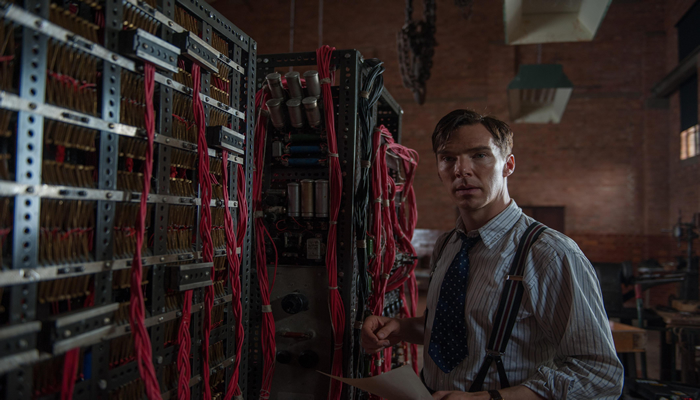In The Imitation Game, Benedict Cumberbatch plays prototypical aspergian genius Alan Turing. Cumberbatch seems to be conjuring a career out of the becheekboned genius at a loss to understand the world, and he makes no divergence here. Indeed, very little effort is made to characterise Turing as anything other than a slightly less haughty Sherlock, and even then there are displays of arrogance and dismissal of foolish underlings which have more than the whiff of Moffat about them. The scene during which Turing has his grand, war-winning revelation is accompanied by a slowly zooming in portrait of Benny’s blank face, lips moving almost imperceptibly with amazingly fast calculations, and one is enthusiastically invited to imagine the formulae flying around his head in post-production script as he delves through his mind palace. He responds to emotion with the same mad eyed, lip trembling panic – this world does not conform to my calculations!
Why are we so enamoured of the emotionally vacant genius? Hero after hero grappling with the subtext and subtlety of the emotive world while his genius precludes him from ever touching it, only pining for it and analysing it with a glassy bafflement – a succession of dramatic Sheldon Coopers. Is this the protagonist that our schizoid late capitalist psyches demand? Read that sentence again. It was good wasn’t it? Hey Vice; I’m available.
Whether these trembling icemen conform to the reality of autism is for better minds than me to judge, but it may be that “absolutely fucking not” blurts out from me all the same.
Meanwhile, Keira Knightley stars as a satire of Keira Knightley, a well judged period piece in which she plays Harry Enfield playing a 1940s English rose – women, know your limits! It seems improbable for a woman so dedicated to a costume drama vision of simpering maidenliness to nail a dreadful parody of a 40s female accent but she does it with aplomb. Despite this, Knightley remains the sole female presence in the film, albeit a caricature of one, and her inclusion seems a transparently cynical grab for some romantic tension.
Ah, yeah. That. The romantic tension; the straightwashing. Turing’s homosexuality functions not as a source of drama or character development – rather a plot hinge, a device by which the rest of the film is exposited. During flashback periods his boyhood self grits his teeth as the film uses symbolism as a bludgeon – the decoding of ciphers serving as Sherlock’s – sorry, Turing’s – decoding of human subtext, feeling, emotion. His infatuation with his childhood friend forms the core of Turing’s true desire while the film flirts with Knightley’s pout in the present of the three narrative threads.
The film is otherwise littered with airdropped Hollywood emotional fish hooks, such as Turing’s fellow mathematicians who he has spent the entire film alienating suddenly standing up for him and befriending him for no reason other than that the plot demands it – what is pitched as a stirring turn of comradeship is written in with no cause or motivation preceding it.
In many ways, the film feels as if it could have been written by Cumberbatch’s Turing himself. It picks apart the ingredients of a film – of Oscar bait – and arranges them with a scientist’s eye. Link by link and cog by cog it rattles past and arrives at the red carpet. Tight, technical, and soulless.
Some of the coverage you find on Cultured Vultures contains affiliate links, which provide us with small commissions based on purchases made from visiting our site.

